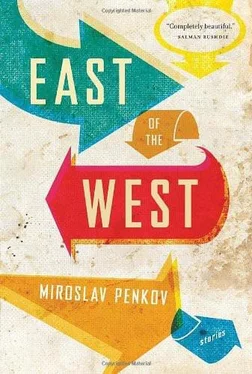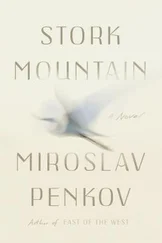“Why are you telling me all this?” Gogo says. He tries to stand up but falls right back down, flat on his ass.
“Wait, listen. My father comes to me after we’re done. ‘Well, he goes, maybe it’s a good thing.’ Meaning maybe, after all, we don’t need to add new books to our gig. Meaning maybe my memory isn’t really good enough for new books. Meaning maybe there was a reason I didn’t make the cut to that school. He didn’t know the page was missing. So all he says is, ‘Well, maybe it’s a good thing.’ ”
“Well,” Gogo says, “maybe it is a good thing, kopche.” He lifts the demijohn up and shakes it empty. Three liters of holy wine, gone.
“What did you say?” I go, and he goes, grunting, “See? Case in point.”
But I don’t see. I don’t see anything at all.
“The thing is, kopche,” Gogo says, “you’ve memorized some ancient books — history, geography, whatever. You keep an article that says you’re great, but aside from this, what have you done? Sure, you’ve killed an old man in a church, but I mean, what have you really done?”
“How about your aunt? Does your aunt count?”
“The Amusing Rado, is that the name you’re going for now?”
None of this is funny to me. I say, “Wait a minute, kopche . Are you telling me you have some doubts that I am the smartest kid that ever lived?” I get up, stumble, fall down again. I really want to shake my finger in his face, but I don’t know if his face is where my finger is shaking. “The last word of the Bible is Amen,” I say. “The first is In . The eye of the ostrich is bigger than its brain. In England, all swans belong to the queen. Winston Churchill was born in a ladies’ room during a dance. Stalin never had a mother. He was born by his aunt. Hitler was born with a full set of teeth, including four fillings and a crown.”
“Oh, yeah,” Gogo says, “the yellow press is a well of knowledge.”
“A yellow well,” I say, and listen to the wind howling, and to the chanting crowd. Then something, like a cricket, starts chirping in my pocket. It’s that rich boy’s pager we won at cards. Come home , dechko, the page reads. Mama fried meatballs .
“Mama fried meatballs,” I say, and chuck the pager to the gloom. I repeat this over and over again, until the meaning rots away from the words. “Kopche,” I say, “watch my chips. I gotta take a piss, all right?”
I get up somehow. With a swift pull I untuck my shirt and the candelabra rattles at my feet. I try to kick, but miss. I try to open the gates, but can’t. There seems to be only one way for me now — up. I can’t piss in the church. I’m not like that. So I start climbing this staircase, these wooden steps, and I look for pots of pelargonium. But the neighbors must be keeping all pots under lock and key now. So up I climb, up until there is nothing left to climb, until wind slices my face. I’m where the bells are hanged.
It’s snowing big, white chunks. Below me are the willows and the people — one million at my feet, two million, eight million. My Bulgarians.
It would be nice, I think, if someone tolled the bells. A metamorphic gesture. No, metaphoric is what I mean. But I just watch the snow fall, and the people still jumping like crickets in my pocket and at my feet.
Jump, my poor sick bastards — or brothers, rather. Mama has fried meatballs for all of us. Jump at my command. At the rise of my hand. Prove that you want change. That you’re not Red.
“Gogo,” I yell, “are you still doubting? Come see what I can do.”
I climb upon the ledge, unzip my pants. My belt hits the rail like a copper tongue.
I’m sorry, my dear Bulgarians. There, you got my apologies beforehand. But I have you all memorized now. Each and every one of you. And so, watch out, my people. This boy has stones in his kidneys.
1.
She fit like a stone in her father’s cupped palm when he first held her. Yellow palm, stained from stringing leaves of tobacco, and she bloody, blind and quiet. She did not scream when her father took her. She did not breathe. A bloody stone was all she was back then. So her father shook her and smacked her face, and then she screamed, and then she breathed.
He raised her up to the ceiling as if God had poor eyesight and wouldn’t see her down where she lay. He called her name, Kemal, which was his name, really, the name of his father, and then repeated it, like a proud song, to make sure that up in the Jannah the angel had heard right and had written her name correctly in the big book.
“You cannot give your daughter a man’s name,” the hodja told him.
“It’s too late now,” her father answered. “It has been written.”
2.
Kemal’s father made bagpipes up in the Rhodope Mountains. Kaba gaydi , they were called — enormous in the arms of the piper, with a low song, monotonous, mournful. He had built himself a workshop in the yard and kept Kemal’s cradle there in the workshop, while he drilled chanters and reeds, while he perforated goat skins and turned them into mehs for his bagpipes.
“Let her breathe in the sawdust,” he’d tell her mother. “Let it flow with her blood and let her heart pump it.”
When Kemal was still very young, her father sat her down on a three-legged chair in the corner and placed in her hands a chisel. He showed her how to carve small half circles on the sides of a chanter and then he told her to make her own patterns. “Make them pretty,” he told her, and so, day after day, while he hunched over his lathe, Kemal carved tiny half-moons and dots like distant stars on a wooden sky. Sometimes she pricked her fingers, sometimes she cut them. But she never cried. She only set the tools on the ground and walked to her father and held her finger up to his lips, the dust red and sticky, so he could suck away the dirty blood, so he could spit the pain out on the floor. Then he made her stomp on it, like a snake’s head under her heel.
When Kemal grew up a little, her father taught her how to choose wood for the chanters. He’d take her out of the village, up the narrow road to the tobacco fields and farther up along the meadows, scouting for dogwood. If they came to the right tree, her father would dig his teeth into a branch and taste it and Kemal, too, would taste it. The more bitter the taste, her father told her, the tougher the wood. The tougher the wood, the softer it sang. Only very hard wood could make music. Then he axed down the tree and pruned its branches, which Kemal roped up and carried home in an armful. They left the stems to dry in the workshop, because, to make music, Kemal learned, the wood had to be dry.
Once, in the winter, they stacked an armful of frozen branches away in the corner and left them there for a few days, in the warm hut. Then one morning Kemal saw that the branches had blossomed: thick white flowers that smelled of dog feces. “This is an omen,” her father told her, and she helped him set the stack on fire.
3.
Kemal’s father kept her head cleanly shaven, though Kemal did not like that. She did not like herself in the mirror. She liked her mother’s hair, the thick black tresses that fell like ropes from under the head scarf. But she was not allowed to touch those tresses nor was she allowed to braid them.
“Enough with this nonsense,” her father had said once while under the awning Kemal had combed her mother’s hair as her mother spun yarn for booties. “The bagpipes are waiting.”
The village children made fun of Kemal because her head was shiny like a lizard’s, because she smelled like a goat, and because her father was crazy. He must be, they told her, or why else would he give his daughter a boy’s name? And if Kemal was really a girl, how come she didn’t wear a shamiya? Didn’t she know that Allah hated women without head scarves? That He sent a plague of hungry maggots to hatch in their brains and eat their innards?
Читать дальше











